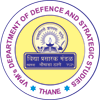VPM's Department of Defence and Strategic Studies
Ensuring the national security of a country is of paramount importance to any country, whether it has a democratic or communist regime or a military dictatorship. Every country in this world, whether small or big, weak or strong, are all faced with some kind of threat to its security from outside. Enmity between different countries could crop up due to various factors like land or border disputes, ideological differences like the tussle between the communist and capitalist blocks or religious intolerance. The terrorism that evolved in the 20thcentury was an offshoot of religious intolerance. It was earlier believed that super nuclear powers like the USA and Soviet Union were immune to any open aggression from outside. Those who believed in such mistaken notions were taken aback in 1991 when the mighty Soviet Union was broken up into different nation states in a clean and bloodless operation carried out by the US-led western agencies. Likewise, in the post-cold war unipolar era dominated by the US, nobody thought that any nation or group will have the capacity or courage to stage a military or terrorist attack on the US. This myth was also exploded when on September 11, 2001 four passenger flights of US airlines hijacked by 19 Al-Qaeda militants in four groups carried out a suicide terrorist mission in the US using the hijacked passenger flights as human missiles to attack selected targets in the US. Two of the flights were crashed into the two towers of the World Trade Center Complex in New York City and the third targeted the Pentagon, the US Defence Headquarters. A fourth flight while trying to target Washington D.C. crashed into a field near Pensylvania. The 9/11 attack in the US makes it amply clear that no country in the world could claim to be free from such mindless terror attacks.
In the above background, the VPM Thane established the Department of Defence and Strategic Studies in 2007 with the following objectives.
1) To study the various aspects and dimensions of the security challenges faced by India and identify the key issues concerning threats to the security and sovereignty and territorial integrity of India.
2) To study the local and global forces involved in stirring up social and ethnic tension between different sections of the society and the role of such forces in provoking secessionist movements in the country.
3) To develop a knowledge-base on the above issues, publish the same and allow for interactions on issues of common interests through various forums, among the concerned fraternity and thus create an awareness about India’s security issues and needs among all sections of people in India.



